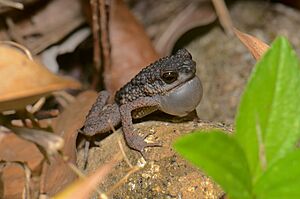Spiny slender toad facts for kids
Quick facts for kids Spiny slender toad |
|
|---|---|
 |
|
| Conservation status | |
| Scientific classification | |
| Synonyms | |
|
Bufo spinulifer Mocquard, 1890 |
The Ansonia spinulifer, also called the spiny slender toad or Kina Balu stream toad, is a type of true toad. It belongs to the Bufonidae family, which includes many different toads. You can find this special toad in northern Borneo. This includes Sarawak and Sabah in Malaysia, and likely also Kalimantan in Indonesia.
Contents
What the Spiny Slender Toad Looks Like
This toad gets its name from its spiny skin! Male Ansonia spinulifer toads are about 30 to 40 millimeters long. That's like 1 to 1.5 inches. Female toads are a bit bigger, growing up to 45 millimeters, or about 1.7 inches.
They have a visible eardrum. Their backs, called the dorsum, are covered in large, spiny bumps. These bumps have hard, pointy tips, which is why it's called "spiny." Often, there's a lighter spot between their shoulders.
About the Tadpoles
The baby toads, called tadpoles, are also unique. They have a special mouth that works like a sucker. This helps them hold onto rocks in fast-moving water. These tadpoles are known as rheophilous, which means they love living in strong currents.
Where the Spiny Slender Toad Lives
The spiny slender toad lives in lowland rainforests. These forests are found at heights of about 150 to 750 meters (about 490 to 2,460 feet) above sea level. Adult toads move around a lot on the forest floor and in low plants. They prefer areas with steep hills.
Breeding and Habitat
For breeding, these toads need small, clear streams with rocky bottoms. Male toads call out at night to attract mates. They usually sit in low plants near the streams. The tadpoles live in these fast-flowing streams. They cling to rocks and eat lithophytes, which are plants that grow on rocks.
Keeping the Spiny Slender Toad Safe
The Ansonia spinulifer is common in Sarawak, Malaysia. However, it doesn't do well when its home changes. It struggles to adapt to new environments. The biggest threat to this toad is habitat loss. This happens when forests are cut down. When trees are removed, streams can get filled with dirt, which harms the tadpoles' homes. Plantations, like palm oil farms, also take away their natural habitat.


